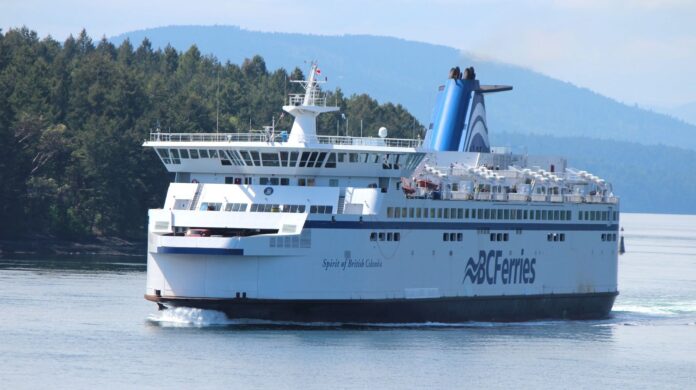Premier David Eby said it is concerning that no Canadian companies bid on a B.C. Ferries contract to build four new major vessels, but he won’t intervene in the company’s decision to award the contract to a Chinese state-owned shipyard.
Eby said Wednesday the vessels are “urgently needed,” and the province cannot risk a service breakdown.
“We don’t want to leave families sitting on the tarmac waiting for a ferry because the propeller fell off, because it’s 50 years old,” he said.
B.C. Ferries announced on June 10 that China Merchants Industry Weihai Shipyard would build four diesel-battery hybrid vessels to replace its oldest ferries. The shipyard is owned by the Hong Kong-based China Merchants Group, which describes itself as a state-owned enterprise.
The decision has drawn criticism from the Opposition B.C. Conservatives and unions representing shipbuilders.
B.C. Ferries has operated as a private company since 2003, when it was converted from a provincial Crown corporation. The province remains its sole shareholder.
The company said CMI Weihai was selected following a global procurement process that considered risk, quality, environmental standards, cost and timelines. While the bidding process was open to Canadian and international companies, no Canadian shipyards submitted a proposal.
“It really tells a story about the hollowing out of the shipbuilding industry in the province that has been taking place over the last 50 years,” said Eby. He said he plans to speak with Prime Minister Mark Carney to ensure future ferries are built in B.C.
The Shipyard General Workers’ Federation said Canadian capacity still exists.
“Many smaller shipyards in Canada have expressed their willingness and capability to collaborate as a consortium to keep this work within our borders,” the union said in a statement last week.
B.C. Building Trades, which represents more than 45,000 unionized construction workers across the province, also criticized the decision in an open letter.
“With the right procurement structure, B.C. Ferries could have easily leveraged B.C.’s world-class shipyards,” the group said. “This will forever be a stain on B.C. Ferries.”
Eby dismissed concerns that his government risks alienating organized labour by allowing the deal to go forward. He said his government works closely with the labour movement and shares its disappointment that the ships won’t be built in Canada.
The Conservative Party of B.C. has called on the province to stop the deal. Party leader John Rustad reiterated that message in a video posted to social media Monday, saying the province has the technology and workforce to build the ferries locally.
Langley-Abbotsford MLA and transportation critic Harman Bhangu issued a statement last week calling for a national security review of the agreement.
“China’s tariffs are putting B.C. jobs at risk, and the answer from B.C. Ferries is to hand China the biggest ferry contract in a generation,” said Bhangu.
B.C. Ferries has not disclosed the contract’s value, citing the need to preserve its ability to secure competitive bids in future procurements. It said the fixed-price agreement is within the approval limits set by the B.C. Ferries commissioner.
The company said a team will be on-site throughout the construction process to monitor progress and ensure safety compliance.
B.C. Ferries said the new ships are needed to replace aging vessels that require complex maintenance and are well past their 45-year operational lifespan. It said the new ferries will offer more than 50 per cent additional passenger capacity and 24 per cent more vehicle space.
The first vessel is expected to enter service in 2029.
Something going on in the Cariboo you think people should know about?
Send us a news tip by emailing [email protected].










